Comprehensive Guide to Garden Maintenance in Mottingham
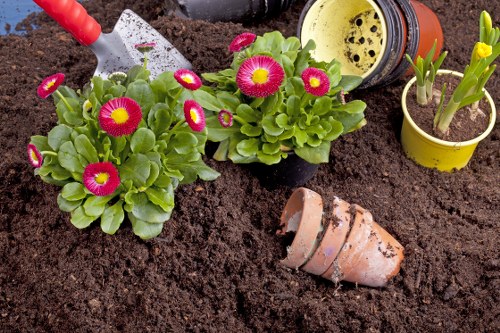
Maintaining a beautiful garden in Mottingham requires a combination of regular care, the right tools, and an understanding of the local climate and soil conditions. Whether you're a seasoned gardener or a beginner, effective garden maintenance can transform your outdoor space into a serene and vibrant environment.
In this article, we'll explore essential tips and strategies for garden maintenance in Mottingham, covering everything from seasonal planting to pest control. By the end, you'll be equipped with the knowledge to keep your garden thriving all year round.
Let's dive into the key aspects of maintaining a lush and healthy garden in this charming area.
Understanding the Local Climate
Climate Overview of Mottingham
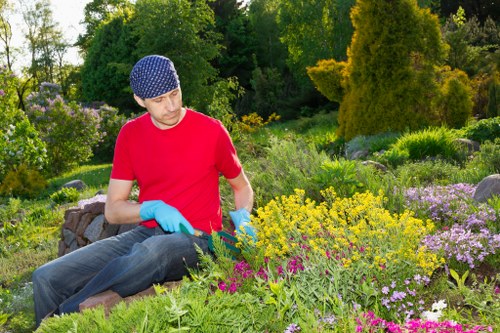
Mottingham enjoys a temperate maritime climate, characterized by mild winters and cool summers. This climate affects the types of plants that can thrive in the area and dictates the gardening practices you should adopt.
Understanding the local weather patterns is crucial for planning your garden. Pay attention to the average rainfall, temperature ranges, and the length of the growing season to make informed decisions about plant selection and maintenance schedules.
Choosing plants that are well-suited to Mottingham's climate will reduce the need for excessive watering and protect your garden from extreme weather conditions.
Soil Composition and Preparation
The soil in Mottingham is predominantly clay-based, which retains moisture but can be heavy and compacted. To create an optimal growing environment, it's important to improve soil structure and fertility.
Begin by conducting a soil test to determine pH levels and nutrient content. Based on the results, you may need to add organic matter such as compost or well-rotted manure to enhance soil texture and nutrient availability.
Proper soil preparation not only supports healthy plant growth but also promotes better drainage and root development.
Seasonal Garden Maintenance Tasks
Spring Maintenance
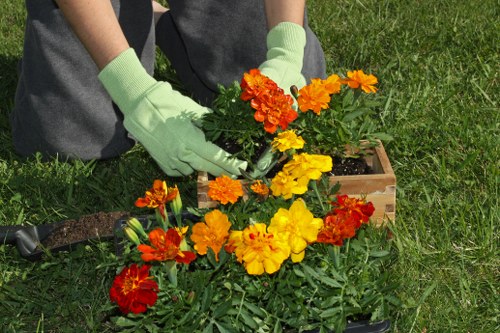
Spring is a critical time for garden maintenance in Mottingham, marking the transition from winter dormancy to active growth. Early spring tasks set the foundation for a successful growing season.
Key Spring Tasks:
- Pruning: Remove dead or damaged branches from trees and shrubs to encourage new growth.
- Weeding: Clear out perennial and annual weeds to reduce competition for nutrients.
- Soil Preparation: Add compost and mulch to improve soil health and moisture retention.
- Planting: Sow seeds and plant early bulbs to establish your garden.
Addressing these tasks in spring ensures your garden is well-prepared to support vigorous plant growth throughout the year.
Summer Maintenance
During the summer months, maintaining adequate moisture levels and protecting plants from heat stress are paramount. Regular watering, especially during dry spells, helps plants thrive.
Additionally, monitoring for pests and diseases is crucial. Implement integrated pest management strategies to address issues promptly without relying heavily on chemical treatments.
Maintaining your garden's appearance during summer also involves deadheading flowers and continuing to prune as necessary to promote airflow and reduce disease risk.
Autumn Maintenance
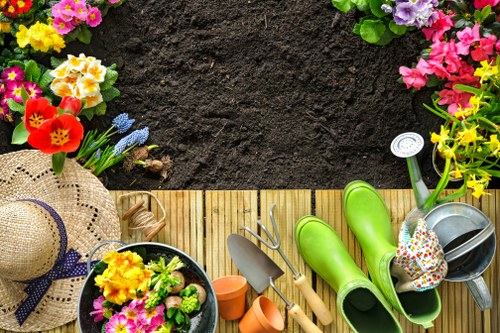
Autumn in Mottingham brings cooler temperatures and increased rainfall, creating ideal conditions for preparing your garden for winter. Key maintenance tasks during this season include:
- Leaf Removal: Clear fallen leaves to prevent the buildup of mold and pests.
- Planting Perennials: Establish perennials that will bloom in the following spring.
- Mulching: Apply mulch to protect plant roots from freezing temperatures.
- Tool Maintenance: Clean and store gardening tools to extend their lifespan.
Proper autumn maintenance ensures your garden remains healthy and resilient through the colder months.
Winter Maintenance
While garden activity slows in winter, certain maintenance tasks are still necessary to protect your plants and prepare for the coming year.
Focus on insulating delicate plants, wrapping young trees, and removing any remaining debris that could harbor pests. Planning for next year's garden by sketching out designs and ordering seeds can also be a productive use of winter time.
Essential Garden Tools and Equipment
Basic Tools for Garden Maintenance

Having the right tools is essential for efficient garden maintenance. Some of the basic tools every gardener in Mottingham should have include:
- Pruning Shears: For trimming and shaping plants.
- Garden Fork: Useful for aerating soil and turning compost.
- Hand Trowel: Ideal for planting and weeding in small areas.
- Rake: Essential for clearing leaves and debris.
- Watering Can or Hose: To ensure plants receive adequate moisture.
Investing in high-quality tools can make garden maintenance tasks easier and more enjoyable.
Advanced Equipment for Enhanced Efficiency
For larger gardens or more intensive maintenance tasks, additional equipment can greatly enhance your efficiency:
- Lawn Mower: Keeps your lawn neat and healthy.
- String Trimmer: For edging and trimming areas that the mower can't reach.
- Leaf Blower: Quickly clears fallen leaves and debris.
- Power Pruners: Simplify the pruning of thick branches.
- Compost Tumbler: Facilitates faster composting of organic waste.
Using advanced equipment can save time and reduce physical strain, allowing you to maintain your garden more effectively.
Pest and Disease Management
Identifying Common Pests in Mottingham
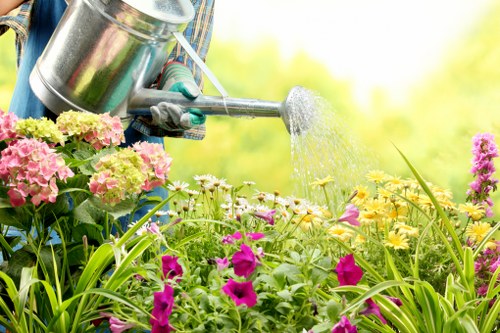
Garden pests can cause significant damage to your plants if not managed properly. In Mottingham, common pests include:
- Aphids: Small insects that suck sap from plants, causing wilting and distortion.
- Slugs and Snails: These mollusks feed on leaves and stems, leaving behind unsightly holes.
- Japanese Beetles: Known for their voracious appetite, they defoliate plants quickly.
- Spider Mites: Tiny arachnids that cause stippling and discoloration of leaves.
- Whiteflies: These small, winged insects excrete honeydew, leading to sooty mold growth.
Early identification and intervention are key to preventing extensive damage from these pests.
Natural Pest Control Methods
Embracing natural pest control methods helps maintain a healthy garden ecosystem without the adverse effects of chemical pesticides.
Beneficial Insects: Encourage predators like ladybugs, lacewings, and predatory beetles that feed on common garden pests.
Neem Oil: A natural pesticide that disrupts the life cycle of insects without harming beneficial species.
Companion Planting: Planting certain species together can deter pests. For example, marigolds repel nematodes and aphids.
Managing Plant Diseases
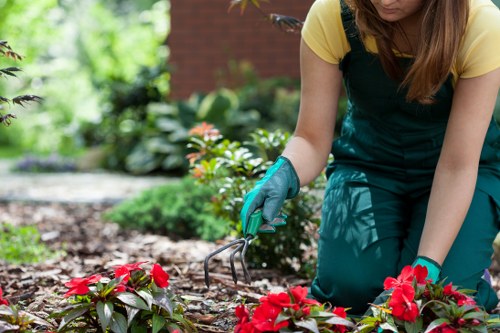
Plant diseases can weaken or kill your plants if not addressed promptly. Common diseases in Mottingham gardens include:
- Powdery Mildew: A fungal disease that causes white powdery spots on leaves and stems.
- Blight: Causes rapid discoloration and death of plant tissues.
- Root Rot: Fungal infections that affect the roots, leading to poor plant health.
- Leaf Spot: Results in dark spots on leaves, which can coalesce and cause leaf drop.
- Rust: Produces rust-colored pustules on leaves and stems.
Preventing plant diseases involves proper plant spacing for airflow, regular pruning, and using disease-resistant plant varieties.
Choosing the Right Plants for Your Garden
Perennials vs. Annuals
When selecting plants for your Mottingham garden, it's important to understand the differences between perennials and annuals:
- Perennials: Plants that live for multiple years, returning each season. They require less replanting and can establish a stable garden structure.
- Annuals: Plants that complete their life cycle in one year. They offer vibrant, seasonal color but need to be replanted annually.
A balanced mix of perennials and annuals can provide continuous interest and color throughout the growing season.
Native Plants Benefits
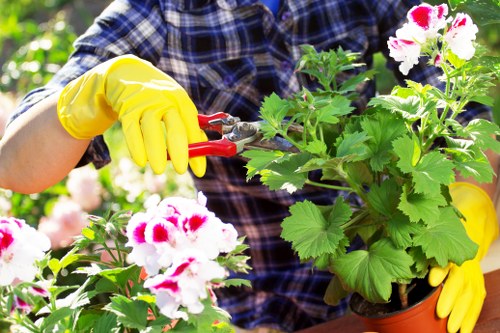
Incorporating native plants into your garden offers several advantages:
- Adaptability: Native plants are well-suited to the local climate and soil conditions, making them more resilient.
- Low Maintenance: They typically require less water and fewer fertilizers, as they are adapted to thrive naturally.
- Wildlife Support: Native plants provide essential habitat and food sources for local wildlife, including pollinators.
- Soil Conservation: Their deep root systems help prevent soil erosion and improve soil structure.
Choosing native species is a sustainable gardening practice that enhances biodiversity and reduces maintenance efforts.
Container Gardening Options
For those with limited space or a desire for flexibility, container gardening is an excellent option. Containers allow you to:
- Control soil quality and drainage.
- Move plants to optimize sunlight exposure.
- Create themed or seasonal displays.
- Grow a variety of plants, including herbs, vegetables, and flowers.
Container gardens can be just as lush and diverse as traditional in-ground gardens, offering creative opportunities for garden maintenance in Mottingham.
Watering and Irrigation Strategies
Efficient Watering Practices

Proper watering is crucial for maintaining a healthy garden. Efficient watering practices conserve water and ensure plants receive adequate moisture.
- Deep Watering: Water deeply but less frequently to encourage deep root growth.
- Early Morning: Water in the early morning to reduce evaporation and fungal risks.
- Mulching: Apply mulch to retain soil moisture and regulate temperature.
- Drip Irrigation: Use drip lines or soaker hoses to deliver water directly to plant roots.
Implementing these practices helps maintain soil moisture levels and promotes vigorous plant growth.
Installing an Irrigation System
For larger gardens, installing an automated irrigation system can save time and ensure consistent watering. Consider the following when setting up an irrigation system:
- Zoning: Divide your garden into zones based on plant types and water requirements.
- Timers: Use timers to schedule watering sessions, reducing manual effort and potential overwatering.
- Maintenance: Regularly check and maintain the system to prevent leaks and ensure efficiency.
- Smart Controllers: Integrate weather-based controllers that adjust watering schedules based on current conditions.
An efficient irrigation system can enhance garden maintenance by providing reliable and precise watering.
Lawn Care and Maintenance
Mowing Techniques

A well-maintained lawn enhances the overall appearance of your garden. Proper mowing techniques are essential for a healthy lawn:
- Correct Height: Maintain your grass at the recommended height for its type to promote dense growth and weed suppression.
- Sharp Blades: Keep mower blades sharp to ensure clean cuts and reduce stress on the grass.
- Mowing Patterns: Vary mowing patterns to prevent soil compaction and encourage upright growth.
- Frequency: Mow regularly, removing no more than one-third of the grass blade length at a time.
Consistent and proper mowing contributes to a lush and resilient lawn.
Fertilizing Your Lawn
Fertilizing provides essential nutrients that support grass growth and color. Consider the following tips for effective lawn fertilization:
- Soil Testing: Conduct a soil test to determine nutrient deficiencies and choose the appropriate fertilizer.
- Timing: Apply fertilizer during the growing season, typically in spring and autumn, when grass can absorb nutrients effectively.
- Application: Follow recommended application rates to avoid over-fertilization, which can damage the lawn and the environment.
- Organic Options: Consider using organic fertilizers to enhance soil health and promote sustainable lawn care.
Proper fertilization ensures a vibrant and healthy lawn that complements your garden's aesthetics.
Pruning and Trimming Techniques
When and How to Prune
Pruning is an essential garden maintenance task that promotes plant health and enhances garden aesthetics. Knowing when and how to prune correctly is crucial:
- Timing: Prune most plants during their dormant season, typically in late winter or early spring, to minimize stress and encourage new growth.
- Tools: Use clean and sharp tools to make precise cuts, reducing the risk of disease transmission.
- Technique: Remove dead, diseased, or crossing branches first, followed by shaping the plant to maintain its desired form.
- Amount: Avoid removing more than one-third of a plant's foliage to prevent excessive stress.
Proper pruning enhances the structure and health of your plants, contributing to a well-maintained garden.
Trimming Hedges and Bushes
Maintaining neatly trimmed hedges and bushes is key to a polished garden appearance. Follow these tips for effective trimming:
- Consistent Shape: Trim hedges and bushes to a uniform shape, matching the overall garden design.
- Height Control: Maintain a consistent height to ensure structural balance and prevent overgrowth.
- Regular Maintenance: Schedule regular trimming sessions to keep plants in shape and encourage denser growth.
- Light Pruning: Remove only a small portion of the plant during each trimming to avoid shocking the plant.
Well-trimmed hedges and bushes add structure and definition to your garden, enhancing its visual appeal.
Mulching and Its Benefits
Types of Mulch
Mulching is a vital practice in garden maintenance, offering numerous benefits such as moisture retention, soil temperature regulation, and weed suppression. There are various types of mulch to choose from:
- Organic Mulch: Includes materials like wood chips, bark, straw, and compost. It decomposes over time, enriching the soil.
- Inorganic Mulch: Comprises materials like gravel, stone, and plastic sheeting. It does not break down but effectively controls weeds and retains moisture.
- Living Mulch: Utilizes cover crops or low-growing plants to protect the soil and provide habitat for beneficial insects.
Selecting the right mulch type depends on your garden's specific needs and aesthetic preferences.
Applying Mulch Correctly
Proper mulch application maximizes its benefits and ensures the health of your plants. Follow these guidelines:
- Depth: Apply mulch to a depth of 2-4 inches. Too much mulch can suffocate plant roots, while too little may not provide adequate coverage.
- Placement: Keep mulch away from plant stems and tree trunks to prevent rot and pest infestation.
- Renewal: Replace or replenish mulch as needed to maintain its effectiveness and appearance.
- Edge Control: Use edging materials to contain mulch and prevent it from spilling into unwanted areas.
Correct mulching techniques support plant health and enhance the overall look of your garden.
Weed Control Strategies
Preventative Measures
Preventing weeds is more effective than dealing with them after they've established. Implement the following strategies to minimize weed growth:
- Mulching: As mentioned, mulch suppresses weed emergence by blocking sunlight.
- Landscape Fabric: Use fabric barriers under mulch to further inhibit weed seeds from germinating.
- Healthy Plants: Maintain vigorous plant growth to outcompete weeds for resources.
- Regular Maintenance: Inspect your garden regularly and remove any emerging weeds promptly.
These preventative measures reduce the incidence of weeds, making garden maintenance easier.
Effective Weed Removal Techniques
When weeds do appear, it's important to remove them efficiently to prevent spreading:
- Hand Weeding: Remove weeds manually, ensuring you get the entire root system to prevent regrowth.
- Hoeing: Use a hoe to cut weeds at the soil surface before they establish.
- Natural Herbicides: Apply vinegar-based or other eco-friendly herbicides to target specific weeds.
- Solarization: Use clear plastic sheets to cover and heat the soil, killing weed seeds and seedlings.
Combining these techniques can effectively manage weed populations in your garden.
Practical Tips for Garden Maintenance
Regular Inspection and Monitoring
Consistent inspection of your garden allows you to identify and address issues before they become major problems. Regularly check for:
- Signs of pests and diseases.
- Plant health and growth progress.
- Weed presence and spread.
- Soil moisture levels.
- Tool and equipment condition.
Early detection through regular monitoring ensures timely intervention and maintains garden vitality.
Organizing Your Gardening Schedule
Creating a structured gardening schedule helps manage maintenance tasks efficiently throughout the year. Consider the following steps:
- Seasonal Planning: Outline tasks specific to each season, ensuring all aspects of garden maintenance are covered.
- Task Prioritization: Identify high-priority tasks and allocate appropriate time for each.
- Consistency: Stick to your schedule to prevent backlog and manage workload effectively.
- Flexibility: Adjust your schedule as needed based on weather conditions and plant needs.
A well-organized schedule maintains garden health and reduces the stress of last-minute tasks.
Eco-Friendly Gardening Practices
Embracing eco-friendly practices not only benefits the environment but also enhances garden sustainability:
- Composting: Recycle organic waste into nutrient-rich compost to enrich your soil.
- Rainwater Harvesting: Collect and reuse rainwater for irrigation, reducing water usage.
- Native Plant Selection: As discussed, native plants require fewer resources and support local ecosystems.
- Reduced Chemical Use: Opt for natural fertilizers and pest control methods to minimize harmful impacts.
- Biodiversity: Diversify plant species to create a resilient and balanced garden ecosystem.
Implementing these practices fosters a healthy, sustainable garden environment.
Hiring Professional Garden Maintenance Services
When to Consider Professional Help
While DIY garden maintenance can be rewarding, there are times when professional assistance may be beneficial:
- Large Gardens: Managing extensive gardens can be time-consuming and physically demanding.
- Specialized Tasks: Complex tasks like tree pruning, irrigation system installation, or landscape design may require expert knowledge.
- Time Constraints: Busy schedules may limit the time available for regular garden maintenance.
- Pest and Disease Management: Severe infestations or disease outbreaks often need professional intervention.
- Seasonal Overhaul: Preparing your garden for seasonal changes can be more efficient with professional help.
Recognizing when to hire experts ensures your garden receives the attention and care it needs.
Choosing the Right Garden Maintenance Service
Selecting a reputable garden maintenance service in Mottingham involves several considerations:
- Experience and Expertise: Look for companies with proven experience and knowledgeable staff in garden maintenance.
- Services Offered: Ensure the service provider offers the specific maintenance tasks you require.
- Reputation: Check reviews, testimonials, and seek recommendations to gauge reliability and quality.
- Pricing: Compare prices and understand the value offered. Beware of unusually low rates that may indicate subpar service.
- Sustainability Practices: Choose companies that prioritize eco-friendly methods and sustainable gardening practices.
Thoroughly evaluating potential service providers ensures you select a partner that aligns with your garden's needs and your personal preferences.
Conclusion
Effective garden maintenance in Mottingham involves a blend of knowledge, proper planning, and the right techniques. By understanding the local climate, preparing the soil, and following seasonal maintenance tasks, you can cultivate a thriving garden year-round.
Implementing best practices in watering, pruning, mulching, and pest control not only enhances the health of your plants but also ensures your garden remains a beautiful and inviting space.
Whether you choose to manage your garden independently or hire professional services, maintaining a well-tended garden requires dedication and consistent effort. Embrace these strategies to enjoy a lush and vibrant garden in Mottingham.
Ready to transform your garden? Contact us today to book your garden maintenance service in Mottingham and experience the difference professional care can make.